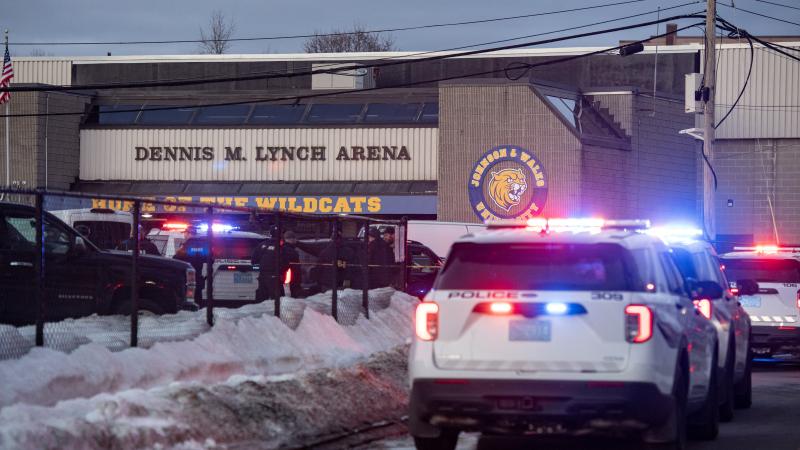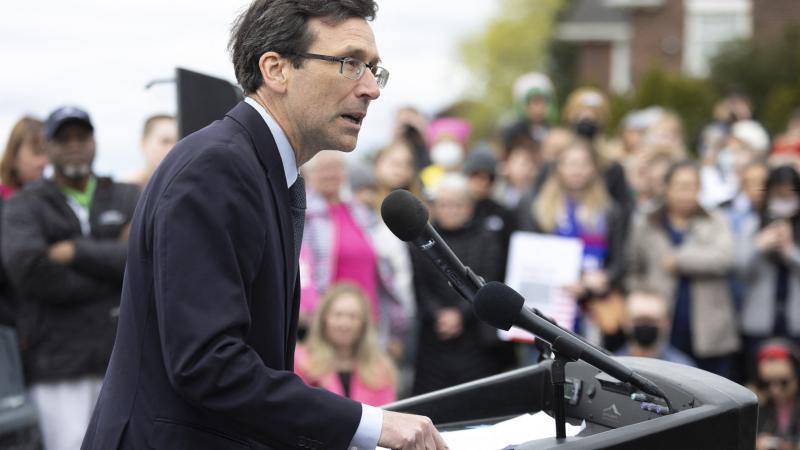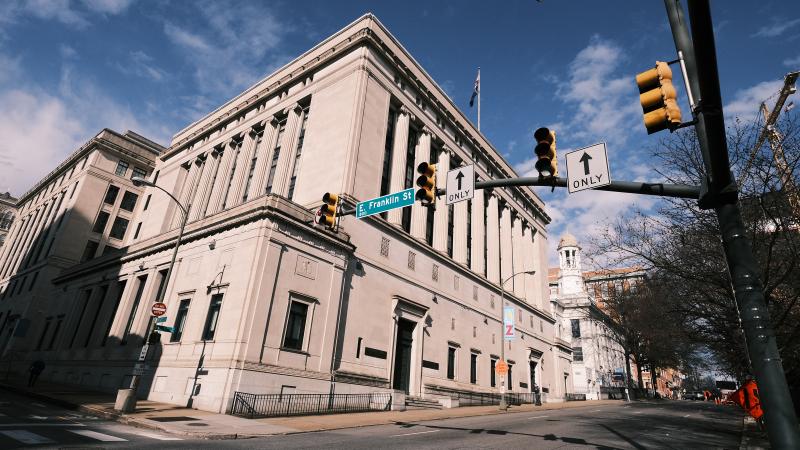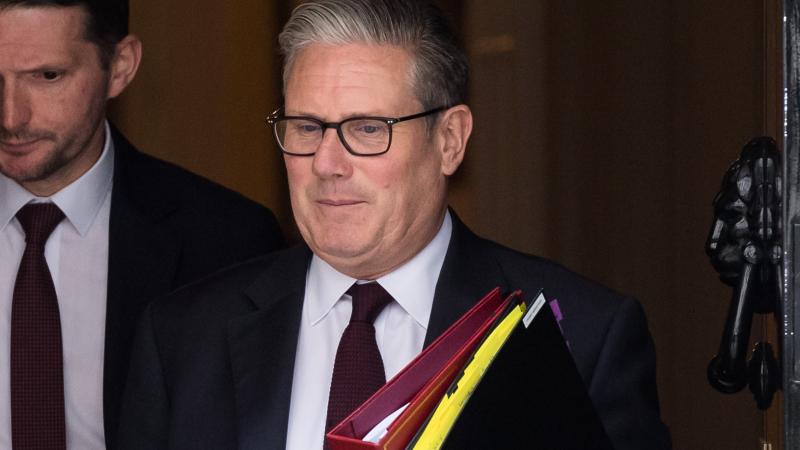John Brennan accused of lying once before in CIA scandal about spying on Senate Intel computers
Above the law again? John Brennan is being investigated by the FBI, apparently related to possibly false statements he made related to his role in the Russiagate saga. He was untouched by the law when he denied the CIA had snooped on the Senate's computers, even though he later admitted the spying happened.
Ex-CIA Director John Brennan may find himself under FBI investigation for allegedly lying to Congress about the Russiagate scandal, but the Obama spy chief has in the past emerged from other lying scandals — including one related to the agency snooping on the Senate — largely unscathed.
CIA Director John Ratcliffe sent a referral to FBI Director Kash Patel related to possible criminality by Brennan, sources told Just the News this week, following a review by the CIA that critiqued the actions taken by Brennan related to the baseless Trump-Russia collusion investigation.
Brennan previously easily survived an Obama-era scandal where he falsely denied that his agency had spied on the Senate Intelligence Committee. One key difference among many is that in the saga a decade ago, Brennan had largely made his false statements in the press, and not as part of a congressional deposition or testimony.
Last week, Ratcliffe released a “lessons learned" review of the December 2016 Intelligence Community Assessment. The review sharply criticized Brennan for choosing the narrative of anti-Trump forces rather than "solid analysis" in pushing to include British ex-spy Christopher Steele’s baseless anti-Trump dossier in the assessment. In Ratcliffe's review, the CIA also critiqued the “high confidence” assessment by the FBI and the CIA that Russian leader Vladimir Putin had “aspired” to help President Donald Trump win in 2016.
While the specifics of Ratcliffe’s criminal referral of Brennan to the FBI were not immediately made public, it is likely that it has to do with Brennan’s potentially false statements to Congress about the ICA and the Steele dossier. Brennan spoke with special counsel John Durham in August 2020 and testified before the House Judiciary Committee in May 2023. Given a five-year statute of limitations, he could be in the crosshairs of law enforcement action until August of this year or until May 2028, respectively.
Not the first time Brennan's veracity has been challenged
Just over a decade ago, the Brennan-led CIA was publicly accused of spying on the Senate Select Committee on Intelligence (SSCI) in 2014, a claim Brennan would repeatedly deny, despite evidence — and, likely, personal knowledge — to the contrary.
The chairwoman of the committee at the time, since deceased Sen. Dianne Feinstein, D-Calif., said the CIA had snooped on SSCI computer systems while the Senate committee conducted its investigation into the agency’s so-called rendition, detention, and interrogation (RDI) program — dubbed “torture” by its critics — which had been launched in the wake of the 9/11 attacks.
Despite Brennan's denials, the CIA inspector general released a report confirming that CIA employees had gained unauthorized and improper access to SSCI shared drives, although an "accountability" board launched by Brennan soon thereafter would end up disciplining zero people involved. Brennan was defended by President Barack Obama and his White House throughout the scandal.
Brennan lamented in his 2020 memoir, Undaunted, that “the myth that ‘the CIA spied on Senate computers’ continues to this day.” But it is hardly a myth.
Brennan vs. Feinstein over CIA spying
The accusation that the CIA had spied on SSCI computer systems burst into public view in 2014.
Feinstein had sent a January 2014 letter to Brennan alleging that CIA personnel had “conducted one or more searches of the computer network at an offsite facility that the CIA had assigned exclusively to the staff of the [SSCI],” according to the CIA inspector general.
Brennan wrote in his memoir that he had a meeting with Feinstein in mid-January 2014.
“The senators were told only that I had a very sensitive matter to discuss and that they could each bring a single senior staffer. I read through my talking points verbatim, making sure that I used language that CIA lawyers and IT experts had agreed was an accurate description of how we found out that the Panetta review was on the SSCI side of RDINet and the reason for our very serious concerns,” the ex-CIA chief wrote. “I emphasized that the entire RDINet computer network was a CIA system and that the CIA had a statutory responsibility to ensure that it was secure, especially in light of the extremely sensitive operational and covert-action information it contained.”
Feinstein took her spying allegations to the floor of the Senate in March 2014, saying that “The CIA just went and searched the committee's computers… I have grave concerns that the CIA’s search may well have violated the separation of powers principles embodied in the United States Constitution, including the speech and debate clause."
"It may have undermined the Constitutional framework essential to effective congressional oversight of intelligence activity or any other government function,” Feinstein said, adding that “I have asked for an apology and a recognition that this CIA search of computers used by its oversight committee was inappropriate. I have received neither,” she added.
Brennan: "Nothing could be further from the truth"
Brennan repeatedly denied Feinstein’s claims shortly thereafter. “Let me assure you that CIA in no way was spying on the SSCI or the Senate,” Brennan told MSNBC in March 2014. Brennan also gave a speech at the Council on Foreign Relations that day, where he again denied Feinstein’s claims.
“As far as the allegations of, you know, hacking the Senate computers, nothing could be further from the truth. We wouldn’t do that. That’s just beyond the scope of reason in terms of what we’d do,” Brennan said, adding that “if I did something wrong, I will explain to the president what I did and what the findings were, and he is the one who can ask me to stay or to go.”
Brennan also said then that “when the facts come out on this, I think a lot of people who are claiming that there has been this tremendous sort of spying and monitoring and hacking will be proved wrong.”
White House Press Secretary Jay Carney said in March 2014 that “the president has great confidence in John Brennan, and confidence in our intelligence community, and in our professionals at the CIA.” Carney repeated that “the president has great confidence in Director Brennan” and that “he’s confident in Director Brennan.”
Brennan wrote in his memoir that he met with Feinstein later in March 2014 in a meeting mediated by then-Vice President Joe Biden. Brennan said that he believed it was actually the SSCI which had acted improperly, not the CIA.
“It is clear that we each believe wrongdoing was done, Dianne,” Brennan says he told her. “We differ, however, on whether wrongdoing was done by committee staff or by CIA officers. But let’s face it. Neither of us knows for certain who did what to those CIA computers that were being used by the committee. We only know what our staffs told us they did and didn’t do.”
Brennan says he added that “if it is determined that any CIA officer did anything inappropriate or wrong, I will personally apologize to you and hold those individuals to account.” No one — including Brennan — would be held accountable.
Truth comes out — and Democrats call for Brennan to resign
The CIA’s Office of Inspector General concluded by the summer of 2014 that CIA employees had secretly accessed the computer network being used by the SSCI as it worked on its report on the CIA’s enhanced interrogation program, and that CIA IT employees had lacked candor with investigators. The CIA watchdog released only a one-page summary at the time.
These revelations compelled Brennan, a strident defender of the CIA’s interrogation program, to apologize for the CIA’s snooping on Senate investigators.
The New York Times headline at the time read “Inquiry by CIA Affirms It Spied on Senate Panel,” the one from CNN said that “CIA apologizes for spying on Senate committee,” and the one from PBS said that “Senate demands public accounting from John Brennan over CIA spying,” as just a few examples.
Brennan then set up an accountability board, Politico reported, led by former White House counsel Bob Bauer and by Sen. Evan Bayh, D-Ind., purportedly to investigate whether disciplinary actions should be taken.
CIA spokesman Dean Boyd said in July 2014 that “Director Brennan was briefed on the CIA OIG’s findings. The director subsequently informed the SSCI chairman and vice chairman of the findings and apologized to them for such actions by CIA officers as described in the OIG report."
Now-former Sen. Mark Udall, D-Colo., responded to the one-page summary in July 2014 by calling for Brennan to resign. Udall also suggested the CIA may have committed crimes, saying that "I also believe the administration should appoint an independent counsel to look into what I believe could be the violation of multiple provisions of the Constitution as well as federal criminal statutes and Executive Order 12333.”
Sen. Martin Heinrich, D-N.M., also said at the time that “at this point it would probably be better for the agency, frankly, if he did step aside. I think that the level of trust between the committee and the director has hit a new low.”
“The investigation confirmed what I said on the Senate floor in March — CIA personnel inappropriately searched Senate Intelligence Committee computers in violation of an agreement we had reached, and I believe in violation of the constitutional separation of powers,” Feinstein said at the time.
Then-Senate Majority Leader Harry Reid, D-N.V., who has also since passed away, was also critical of the CIA’s actions at the time. "The CIA Inspector General's report describes actions by the CIA that are appalling and deeply threatening to our system of checks and balances,” Reid said. “Congress has a constitutional responsibility to conduct oversight and the CIA’s actions were an attempt to undermine that responsibility [...] The deeply troubling CIA actions show to what lengths some in the CIA are willing to stoop in order to prevent the report's release and to avoid accountability."
Obama White House circles the wagons
The Obama White House continued to circle the wagons around Brennan after the CIA watchdog report summary came out, and Brennan was soon back to denying that any real snooping had occurred.
White House press secretary Josh Earnest said “absolutely not” when asked in July 2014 if the saga had harmed Brennan’s credibility. “Director Brennan has done what is necessary to get to the bottom of what exactly happened. He has been candid about the inconsistencies that the IG found, and he has taken the additional step of appointing somebody who does not work at the CIA to conduct a review, an accountability review of what exactly happened and to determine what’s necessary to hold those individuals accountable,” Earnest said.
Obama himself also defended Brennan at an early August 2014 press conference. “I have full confidence in John Brennan. I think he has acknowledged and directly apologized to Senator Feinstein that CIA personnel did not properly handle an investigation as to how certain documents that were not authorized to be released to the Senate staff got somehow into the hands of the Senate staff."
Brennan equivocated in public in September 2014 about what the CIA had actually done wrong, doubling down on his prior comments in some ways. “Did, in fact, CIA officers hack into the Senate computers to thwart the investigation on detention and interrogation — thwart the investigation hacking in? No, we did not. And I said, that's beyond that scope of reason,” Brennan said, adding that “I apologized then to them for any improper access that was done, despite the fact we didn't have a memorandum of agreement. And so what I've said to the committee and to others is that if we do something wrong, I'll stand up in a minute, but I'm not going to take, you know, the allegations about hacking and monitoring and spying and whatever else. No.”
Watchdog report says CIA “improperly accessed” Senate Intel computer files
The full CIA inspector general report, which had been completed half a year earlier, was finally approved for release in January 2015, and it found that the CIA had indeed “improperly accessed” SSCI computer files on a shared drive.
“Five agency employees, two attorneys and three information technology (IT) staff, improperly accessed SSCI Majority staff shared drives on the RDINet,” the watchdog report found, adding that “OIG investigation found support for allegations that CIA staff intentionally accessed the SSCI shared drive without authorization and exceeded authorized access.”
The watchdog investigation “did not find support for the allegation that CIA performed real-time interception of SSCI communications for its review of the matter in question, however, the CIA did review stored information that included [REDACTED] and a review of some of the emails of SSCI Majority staff members of that network.”
The CIA watchdog said that the Obama Justice Department wrote to them in July 2014 to say that “DOJ had completed its review of the allegations and had no prosecutorial interest.”
Brennan’s CIA filed criminal referral against SSCI
The CIA watchdog review also said that the CIA had actually filed a criminal referral with the Justice Department arguing that it was the SSCI which had broken the law — a referral which the CIA inspector general ruled was baseless.
“The Agency filed a crimes report with the DOJ, reporting that SSCI staff members may have improperly accessed Agency information on the RDINet,” the watchdog report said. “The OIG investigation determined that the factual basis for this referral was unfounded and the author of the letter had been provided inaccurate information on which the letter was based. … The OIG investigation determined that there was no factual basis for the allegations made in the CIA crimes report.”
Brennan revealed in his memoir that it was likely he who had set off the chain of events which led to a baseless criminal referral being made against the SSCI.
Brennan claimed that “while I had reservations about the wisdom and likely implications of the CIA making a criminal referral to Justice about SSCI staff, I recognized that it was the acting general counsel’s decision. As a CIA director appointed by a Democratic president, there was no way I was going to stop the Agency’s top lawyer from making what he believed was a prudent criminal referral about the alleged actions of Senate Democratic staffers. If I had prevented the referral from going forward, I am sure that some within the Agency would have questioned whether I did so for political reasons.”
But the ex-CIA chief said that “looking back on it now, I wish I had taken a more activist role in trying to stop the referral, as it had the very unfortunate effect of pouring gasoline on an already raging fire.”
Evidence suggests Brennan knew more than he let on
The CIA watchdog report also suggested that Brennan knew more about at least some of the CIA’s improper actions prior to his public denials.
“The investigation found that D/CIA Brennan did not authorize the access or know the extent of the access, and OIG obtained conflicting testimony regarding whether or not D/CIA Brennan had any knowledge of a [REDACTED] review performed on the SSCI shared drive [REDACTED] until after it was completed,” the watchdog wrote.
The watchdog said that “according to [REDACTED], D/CIA Brennan tasked [REDACTED] to ‘use whatever means necessary’ to find out how the documents had ended up on the SSCI shared drive.”
The inspector general said, however, that “D/CIA Brennan stated that he would never use those words. … D/CIA Brennan stated that he wanted to know how the documents got to the SSCI side but did not direct anyone to review the SSCI systems.”
Included as an addendum to the CIA watchdog report was an accounting of the events by an unnamed CIA lawyer who stated that he had indeed ordered CIA IT employees to search the SSCI systems in early January 2014, although he insisted that he had directed them to ensure their snooping be “extremely narrow, limited simply to a simple identification of the presence of particular CIA documents, not SSCI materials.”
The unnamed CIA lawyer then recounted a meeting he had with Brennan in mid-January 2014, where he explained what had taken place.
"I informed the Director of my view that the conduct in question [by SSCI] could be criminal, and that the Agency—based solely on its current understanding, that unauthorized documents existed on the SSCI side of the system and had been repeatedly accessed—had an obligation to answer the question of whether there had been a security violation or potential violation of law that should be referred to the Department of Justice,” the CIA lawyer said.
Brennan then reportedly ordered a “pause” in the CIA’s spying efforts, according to that lawyer’s account. This would indicate that Brennan was aware of the CIA’s snooping on the SSCI in January 2014 — two months before his public denials in March 2014.
CIA “accountability” board lets everyone off the hook
The CIA’s Rendition, Detention, and Interrogation Network Agency Accountability Board report was also released in January 2015 — at the same time as the full CIA watchdog report. The CIA board spent much of its report defending the actions of the CIA, and ruled that no one should be punished.
Brennan reportedly recused himself from the decision, and it was Brennan's deputy Avril Haines who accepted the board’s conclusion that no discipline was needed. Haines would go on to serve as future President Joe Biden’s Director of National Intelligence.
The CIA board noted in its January 2015 report that “the IG referred this matter to the Department of Justice for potential violations of the Wiretap Act and the Computer Fraud and Abuse Act” but insisted that “the facts and circumstances of this case do not support the use of either statute to establish ‘unauthorized access’ by these Agency personnel.”
The board’s report also attempted to argue that the watchdog’s finding that the CIA’s IT employees had displayed a “lack of candor” was “unsupported for numerous reasons.”
The CIA accountability board also said that “after examining the facts, the Board recommends no disciplinary actions are warranted for” the CIA employees because “the Board found the actions and decisions of these officers to be reasonable in light of their responsibilities to manage an unprecedented computer system.”
Feinstein blasts lack of accountability — and Brennan celebrates it
Feinstein responded to the CIA board’s findings with disappointment, saying that “I’m thankful that Director Brennan has apologized for these actions, but I’m disappointed that no one at the CIA will be held accountable. The decision was made to search committee computers, and someone should be found responsible for those actions.”
“The report released by the CIA Accountability Board, which recommended no accountability for wrongdoing by CIA personnel, contains many mistakes and omissions,” Feinstein said in a lengthy press release. “The bottom line is that the CIA accessed a Senate Intelligence Committee computer network without authorization, in clear violation of a signed agreement between the committee and former Director Leon Panetta. That access, and the subsequent review of committee staff emails, breaches the constitutional separation of powers between Congress and the executive branch.”
Feinstein’s statement included “a list of 15 ways the CIA Accountability Board’s report is inaccurate or incomplete in the hope that errors in the report and the public record can be corrected.”
Brennan, unsurprisingly, also defended the accountability board’s own lack of accountability in his memoir.
“I found the board’s work to be exceptionally thorough—much more so than the IG’s quick initial review—and I was very pleased when the board determined in December 2014 that no CIA officer had acted in bad faith and recommended against taking any administrative actions,” Brennan wrote, praising the board’s “clear articulation that the CIA forensic search of RDINet was appropriate, prudent, and lawful.”
The SSCI report which the CIA had been snooping on ended up being released in late 2014. The Feinstein-led report concluded that “the CIA’s justification for the use of its enhanced interrogation techniques rested on inaccurate claims of their effectiveness.” Feinstein stated at the time that “under any common meaning of the term, CIA detainees were tortured.”
Republicans on the committee — led by then-Sen. Marco Rubio, R-Fla., and others released a response disputing the Democratic majority’s conclusions, with the GOP members arguing that “we have no doubt that the CIA’s detention program saved lives and played a vital role in weakening al-Qaeda while the program was in operation” and that the CIA interrogation program “enabled a stream of collection and intelligence validation that was unprecedented.”
It remains unclear if the alleged masterminds of the 9/11 attack — Khalid Sheikh Mohammed and others — will ever face a death penalty trial down at Guantanamo Bay, in part due to controversy surrounding their interrogations while in CIA custody, as well as due to befuddling actions taken by the Defense Department under Lloyd Austin.
It also remains to be seen whether Brennan will skate over what may be lies related to the 2016 ICA and the Steele dossier in the same way he dodged accountability for the CIA’s snooping on the SSCI’s terrorist interrogation report.
The Facts Inside Our Reporter's Notebook
Links
- sent a referral
- "lessons learned" review
- baseless anti-Trump dossier
- potential false statements
- publicly accused
- repeatedly
- deny
- said
- confirming
- "accountability" board
- defended
- 2020 memoir, Undaunted
- letter
- memoir
- said
- told
- said
- said
- said
- memoir
- concluded
- one-page summary
- said
- said
- said
- set up
- led
- said
- said
- saying
- said
- said
- said
- said
- memoir
- defended
- equivocated in public
- full CIA inspector general report
- said
- said
- said
- memoir
- report
- addendum
- report
- go on to serve
- report
- said
- saying
- said
- told
- memoir.
- concluded
- response
- Khalid Sheikh Mohammed
- befuddling actions














